

2012 Book Spine Poem Gallery. National Poetry Month has arrived, and we’re celebrating with book spine poetry.

Three (maybe even four) cheers for everyone who gave it a shot. If you try book spine poetry during the month of April, snap a picture, post it to your blog, or email it to me at scopenotes at gmail dot com. I’ll add to this gallery for the entire month. Click here for the 2013 gallery Click here for the 2011 gallery Click here for the 2010 gallery. 5 Googley Ways to Celebrate National Poetry Month with Eric Curts. Eric Curts gives us five ways to use Google apps, extensions and tools to celebrate Poetry Month.
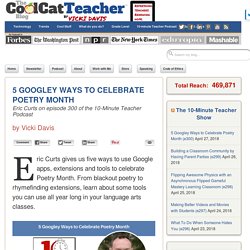
From blackout poetry to rhymefinding extensions, learn about some tools you can use all year long in your language arts classes. Advancement Courses has more than 200 graduate level online PD courses for K-12 teachers. Go to advancementcourses.com/coolcat and use the code COOL20 at checkout for 20% off any course. Listen Now 5 Ways to Celebrate Poetry Month Link to show: www.coolcatteacher.com/e300 Date: April 27, 2018 Vicki: Today we’re talking with my “Mr. Blackout Poetry.
Over Christmas break, I received a message from a high school graduate, urging me to check out the poetry of Tyler Knott.
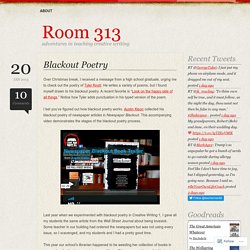
He writes a variety of poems, but I found myself drawn to his blackout poetry. A recent favorite is “Look on the happy side of all things.” Notice how Tyler adds punctuation in his typed version of the poem. Poems - Child Soldiers. Representative Poetry Online. Poetry. Performance Poetry Rubric. American Studies Performance Poetry Performance Poetry Assessment Dear Performer, Now that you have written a poem about a person or an event from either the Gilded Age or the Progressive Era, you will be expected to bring this piece to life on the stage.
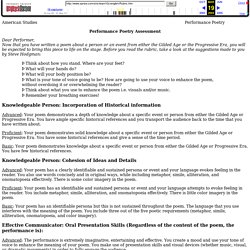
Before you read the rubric, take a look at the suggestions made to you by Steve Hodgman: Þ Think about how you stand. Where are your feet? Knowledgeable Person: Incorporation of Historical information Advanced: Your poem demonstrates a depth of knowledge about a specific event or person from either the Gilded Age or Progressive Era. Proficient: Your poem demonstrates solid knowledge about a specific event or person from either the Gilded Age or Progressive Era.
Basic: Your poem demonstrates knowledge about a specific event or person from either the Gilded Age or Progressive Era. Knowledgeable Person: Cohesion of Ideas and Details Basic: Your poem has an identifiable persona but this is not sustained throughout the poem. Outta Ray's Head Poetry Lessons. I started out to do a lesson on poetry and before I knew it the whole thing was getting out of hand and I ended up with a page with links.
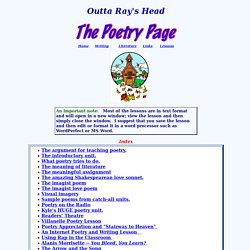
I just like poetry too much and over the years I have developed more than a dozen integrated units that revolve around themes and/or styles. I have a firm belief that poetry has got to be taught within an easily understood frame such as "imagist' poetry or "love" poetry or "humanist" poetry or "modern problems"; you just can't throw a bunch of poems together and hope to get to the test with as little hassle as possible.There is one overwhelming argument in favour of teaching poetry and that is that it is a form of communication and part of an English teacher's job is to teach communication skills. You might also impress upon your students the following bit of thinking: Poetry Teachers. Poetry Writing with Jack Prelutsky. Word Warm-Ups Just as you would stretch before you go running, you need to warm up before you start writing poetry.
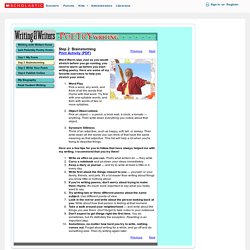
Here are some of my favorite exercises to help you stretch your mind: Word Play Pick a word, any word, and think of all the words that rhyme with that word. Try first with one-syllable words, and then with words of two or more syllables. The English Room-30 Days of Poetry-Student Activity. 30 Days of Poetry-Day 4.
Synonym Poetry. Brief Description Students choose a word -- any word -- think about what it means to them, and build synonym poems around their words!
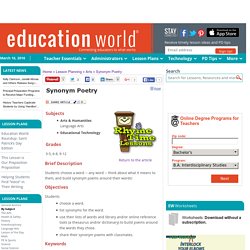
Objectives Students choose a word. list synonyms for the word. use their lists of words and library and/or online reference tools (a thesaurus and/or dictionary) to build poems around the words they chose. share their synonym poems with classmates. Keywords. Stage a Poetry Slam! Brief Description Students participate in a classroom or school-wide poetry slam.
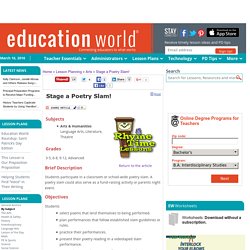
A poetry slam could also serve as a fund-raising activity or parents night event. Objectives Students select poems that lend themselves to being performed. plan performances that follow established slam guidelines or rules. practice their performances. present their poetry reading in a videotaped slam performance. use a rubric or scale to rate performances by their peers (optional). Keywords. A Laugh and a Half: Funny-Poem Mobiles. Materials for creating mobiles (See Make a Mobile below for a variety of different mobiles students might create.)

This activity, which works well in 30-minute segments over a week or two, can be done in the classroom, the computer lab, or the library. In advance of the lesson, gather a large number of books of poems. You might include humorous poems by such poets as Shel Silverstein, Jack Prelutsky, Karla Kuskin, Grandpa Tucker, Kenn Nesbitt, Dr. Seuss, Ogden Nash, Robert Pottle, and Edward Lear. Diamond Poems Across the Curriculum. Brief Description Students build vocabulary skills, teach parts of speech, and have fun with diamond poems!
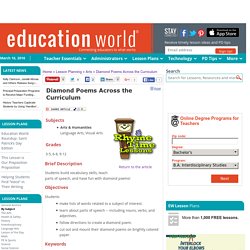
Objectives Students make lists of words related to a subject of interest. learn about parts of speech -- including nouns, verbs, and adjectives. follow directions to create a diamond poem. cut out and mount their diamond poems on brightly colored paper. Keywords. Rap, Seventh Grade and Student Engagement. 10 Ways to Use Poetry in Your Classroom. Often when I mention poetry during a workshop, at least one teacher laments, "I would love to do more poetry with students, but there's so much else to teach in my curriculum!
" What I try to encourage (and I'm often helped big time by the workshop participants) is for this teacher to consider using poetry within her curriculum, as an integral part of her language, reading, and writing lessons, rather than as an add-on. In other words, I ask her to find a purpose for poetry. Now, before you poetry purists flame me and cry out, "Poetry is in itself worth reading! " let me explain that I agree with you. I fondly recall organizing poetry picnics in third grade, where we would spread sheets and blankets on the field adjacent to the school playground and share favorite poems as we munched on morning snacks.
But at the same time, I'm a realist. 1. Students are most receptive to new learning when they can connect it to what they already know. Recommended texts 2. Hip-Hop Helps Teach Everything from English to Algebra. From Tupac to Thomas: Alan Sitomer's English classes are much more animated now that hip-hop lyrics are part of the poetry lesson plan. Like many 16-year-olds, Amir Ali spends a lot of time after school talking with friends about sports, girls, and music -- specifically, hip-hop music.
But last year, during his sophomore year at Lynwood High School, in Lynwood, California, Ali noticed a drastic shift in these spirited afternoon after-school conversations. "Suddenly, everyone wanted to talk about English class," Ali remembers. "A friend even said she was looking forward to English class the next day. The difference? The intellectual awakening struck, as they often do, when Sitomer was sleep deprived, up at 2 a.m. trying to finish a lesson plan on English poet Dylan Thomas. Then it hit: Sitomer began thinking about Tupac Shakur, a deceased rapper his students idolized and whose music they often played.
Teaching Poetry: Generating Genuine, Meaningful Responses. ERIC Digest. ERIC Identifier: ED307609 Publication Date: 1989-04-00 Author: Frankenbach, Charlie Source: ERIC Clearinghouse on Reading and Communication Skills Bloomington IN. Charles R. Duke (1984) has noted, "English teachers have given some attention to aesthetic reading, usually terming it the development of literary appreciation, but many of the classroom practices used to foster that appreciation have been counter-productive. " Instruction on comprehending and appreciating poetry has especially been regarded as ineffective. Either because of a lack of appreciation for their students' abilities to study poetry or because of well-intentioned enthusiasm to show students the wonders of the form, many teachers have force-fed "meanings" to puzzled students or have taught poetry by way of dissecting poetic techniques--here is a symbol, here is a metaphor, and so on.
Fillion urges that students be provided with opportunities to identify a poem's relevance to their lives. Duke, Charles R. Morgan, Mary.